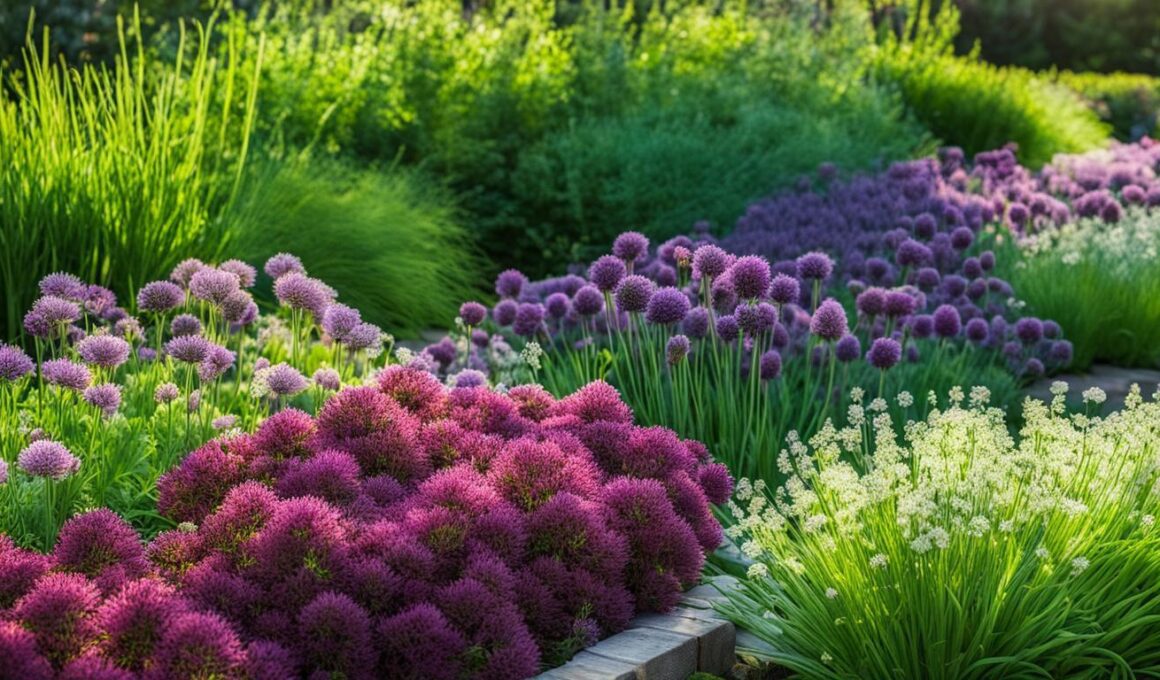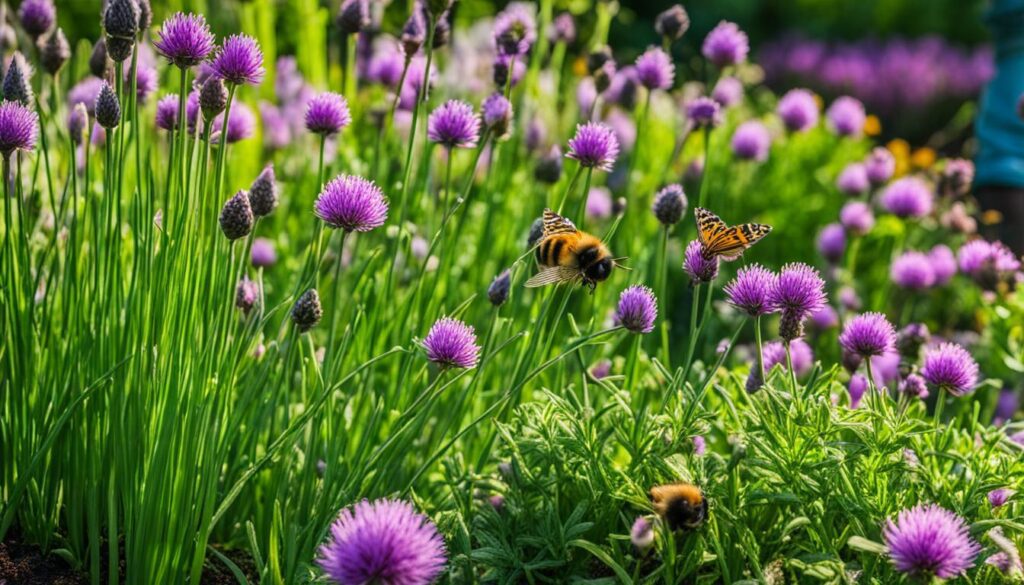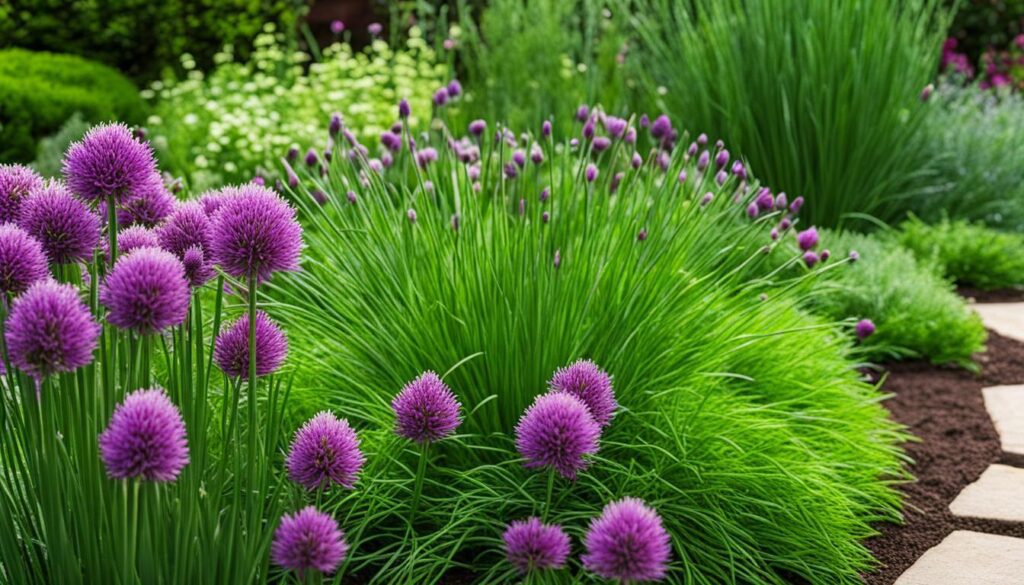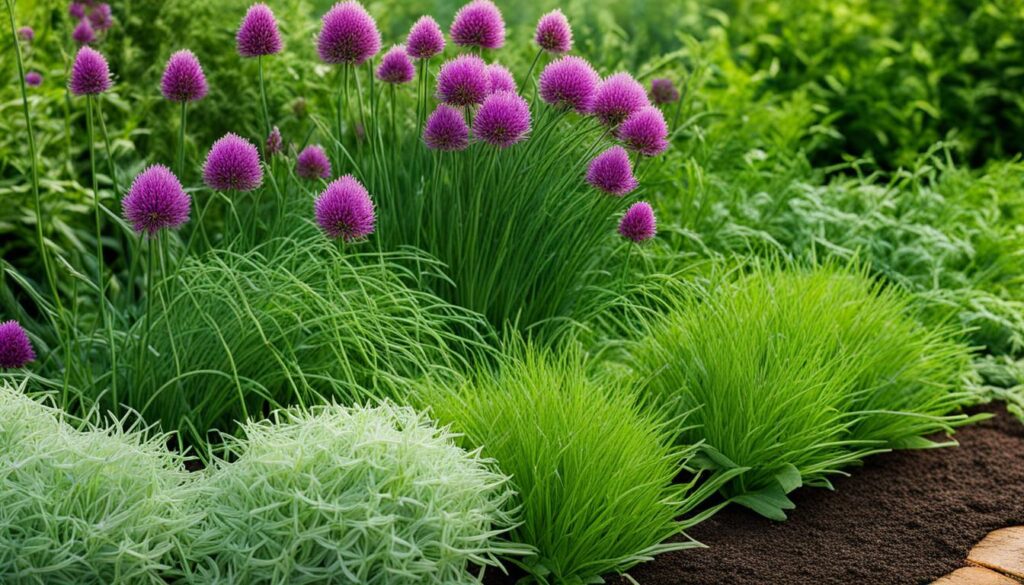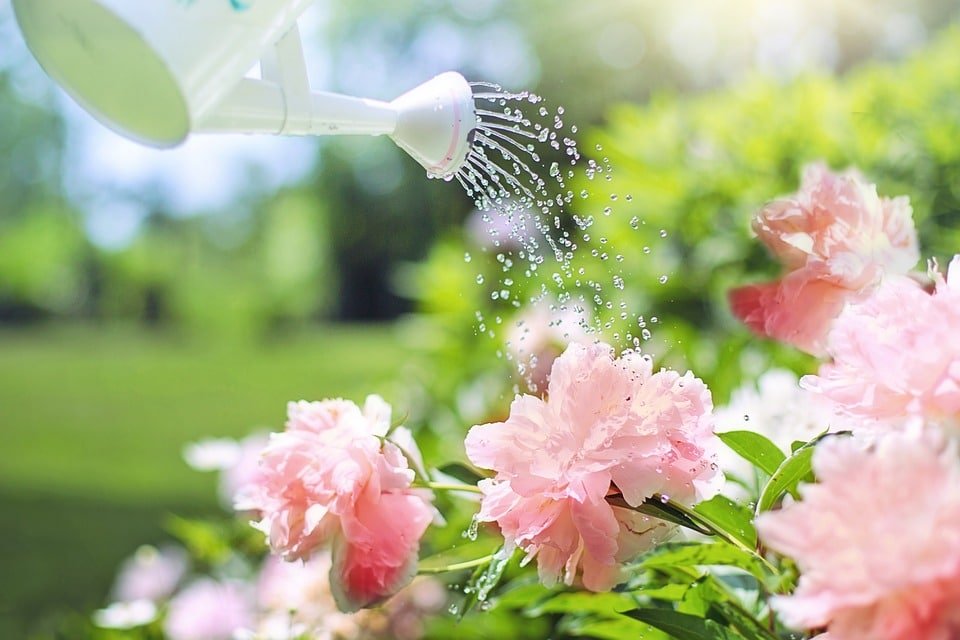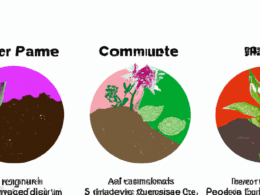Chives are a popular herb in culinary gardens and can enhance the flavor of many dishes. They have sulfur-based oils that not only provide their distinctive oniony flavor but also act as a deterrent for pests. Chives are known to attract pollinators and have positive effects on neighboring plants. They are often used as companions to roses, apple trees, grapes, and vegetables like carrots, celery, lettuce, peas, and tomatoes. Chives can repel pests like aphids, cucumber beetles, and Japanese beetles, and they enhance the growth and flavor of various plants. They also blend well with other herbs and can be a valuable addition to herb pots.
Key Takeaways:
- Chives are a versatile herb that enhances the flavor of dishes.
- They repel pests and attract pollinators, benefiting neighboring plants.
- Chives are compatible with roses, apple trees, grapes, and various vegetables.
- They can be grown alongside other herbs in herb pots.
- Chives promote the growth and flavor of companion plants.
Benefits of Companion Planting with Chives
Companion planting with chives offers several benefits for your garden. By strategically planting chives alongside other plants, you can harness their natural properties to enhance growth, deter pests, and promote pollination. Chives contain sulfur-based oils that act as a natural pest repellent, keeping harmful insects at bay. Additionally, they attract beneficial insects like bees and butterflies, which play a crucial role in pollination.
When grown near roses, chives can help repel black spot, a common fungal disease that affects these beautiful flowers. Chives also deter borers, which can cause damage to apple trees. Planting chives near grapevines can help deter insect pests and increase pollination, resulting in healthier and more abundant harvests. In vegetable gardens, chives have the power to repel a wide range of insects, including aphids and cucumber beetles, while also attracting important pollinators.
Aside from their pest-repelling properties, chives also add ornamental value to gardens. Their delicate purple flowers can enhance the aesthetics of perennial gardens or herb containers. Moreover, combining chives with other culinary herbs creates a harmonious blend of flavors in your dishes. Whether you’re growing chives with basil, oregano, parsley, or thyme, these combinations can elevate your culinary creations to new heights.
Quotes:
“Companion planting with chives is a win-win situation. Not only do they benefit neighboring plants, but they also add beauty and flavor to your garden.” – Gardening enthusiast
Benefits of Companion Planting with Chives:
- Repels pests such as aphids, cucumber beetles, and borers
- Attracts beneficial insects like bees and butterflies
- Enhances growth and flavor of neighboring plants
- Repels black spot in roses and apple scab in apple trees
- Deters insect pests and increases pollination in grapes
- Improves fruit and vegetable yields in vegetable gardens
- Adds ornamental value to gardens with delicate purple flowers
- Creates harmonious flavor profiles when combined with other culinary herbs
Ideal Companions for Chives
Chives are known for their versatility and ability to pair well with a variety of plants. When it comes to herbs, chives make excellent companions for basil, oregano, parsley, dill, marjoram, tarragon, and thyme. These combinations create harmonious flavor profiles that can elevate any culinary dish.
When it comes to vegetables, chives thrive alongside carrots, tomatoes, sunflowers, grapes, and other members of the Allium family. Planting chives near these companions can enhance their flavor, promote healthy growth, and increase their resistance to pests. It’s important to consider the specific needs of each plant and group them accordingly to maintain a successful companion planting system.
“Chives pair well with basil, oregano, parsley, dill, marjoram, tarragon, and thyme.”
By strategically selecting ideal companions for chives, you create a symbiotic relationship in your garden. These combinations not only provide aesthetic appeal but also contribute to the overall health and productivity of your plants. Whether you’re growing herbs or vegetables, consider adding chives to your garden for a bountiful and flavorful harvest.
Growing Chives with Other Culinary Herbs
Chives are an excellent addition to any herb garden, especially when paired with other culinary herbs. The combination of flavors and scents can create a harmonious and inspiring environment for home chefs and herb enthusiasts. When planted together, chives and other herbs like basil, oregano, parsley, rosemary, sage, thyme, lavender, and mint form a diverse and aromatic collection that can elevate your culinary creations.
By growing chives with other culinary herbs, you can easily access a range of fresh flavors for your cooking. Whether you’re making a zesty pesto with basil and chives or adding a touch of mint and chives to your summer cocktails, these herb combinations can take your dishes to the next level. Not only do they enhance the culinary experience, but they also promote a thriving herb garden by attracting beneficial insects and repelling pests.
“Combining chives with other herbs not only enhances the culinary experience but also promotes a thriving herb garden.”
Creating a Herb Pot
If you have limited space or prefer a portable herb garden, consider growing chives and other culinary herbs together in a herb pot. This allows you to have a variety of herbs in a small space and easily move them as needed. Choose a pot with good drainage and use a high-quality potting mix to ensure your herbs thrive.
- Plant chives in the center or towards the back of the pot, as they can grow tall.
- Surround them with other herbs, such as basil, parsley, or thyme.
- Place taller herbs towards the back of the pot and shorter herbs towards the front to create visual interest.
- Ensure each herb has enough space to grow and receive adequate sunlight.
With a herb pot, you’ll have a convenient and versatile herb garden right at your fingertips. Whether you’re cooking up a storm in the kitchen or simply enjoying the beauty and fragrance of your herb garden, growing chives with other culinary herbs is a delightful and rewarding experience.
Tips for Successful Companion Planting with Chives
When it comes to successful companion planting with chives, following these tips will help you create a thriving garden ecosystem. Firstly, it’s important to consider the specific needs of each plant and group them accordingly. Chives prefer full sun and well-drained soil, so it’s best to select companion plants that thrive under similar conditions. This will ensure that all plants in the vicinity can grow and flourish together.
Additionally, it’s crucial to be mindful of any potential negative interactions between plants. Some plants may have competitive root systems or release substances that inhibit the growth of neighboring plants. By researching and selecting plants that have compatible growth patterns and characteristics, you can avoid any conflicts and encourage a harmonious coexistence.
Garden hygiene is another important aspect to consider for successful companion planting. Regularly monitor your plants for signs of diseases or pests and take immediate action to prevent their spread. This includes removing any infected plants or using organic pest control methods to maintain a healthy garden ecosystem.
- Consider the specific needs of each plant
- Group plants according to their requirements
- Be mindful of potential negative plant interactions
- Maintain good garden hygiene
Following these tips will help you ensure successful companion planting with chives in your garden. By creating a favorable environment for all your plants and being mindful of their individual needs, you can foster a thriving garden that benefits from the natural synergies and advantages of companion planting. Happy gardening!
The Beauty of a Container Herb Garden
If you have limited space or want to create a portable herb garden, consider growing chives in containers. Chives are well-suited for container gardening and can be grown alongside other herbs in pots. This allows you to have a variety of herbs in a small space and easily move them as needed.
Choose pots with good drainage, use a high-quality potting mix, and provide adequate sunlight for your container herb garden to thrive. Growing chives in containers also makes it easier to control pests and diseases, as well as maintain optimal growing conditions for each plant.
With a container herb garden, you can enjoy the convenience of having fresh chives at your fingertips for culinary use. The compact nature of container gardening makes it ideal for urban dwellers, apartment balconies, or anyone with limited outdoor space. Plus, it adds a touch of beauty and greenery to your living space. Whether you’re a seasoned gardener or just starting out, a container herb garden with chives is a rewarding and manageable project.
Benefits of a Container Herb Garden with Chives:
- Space-saving solution for those with limited gardening space
- Portable and can be easily moved as needed
- Control over growing conditions, such as soil quality and sunlight exposure
- Easier pest and disease management
- Convenient access to fresh chives for culinary use
- Aesthetically pleasing addition to any living space
“A container herb garden with chives is not only a practical gardening solution but also a beautiful addition to your home. Enjoy the benefits of having fresh herbs right at your fingertips while adding a touch of greenery to your living space.” – Gardening Expert
Conclusion
Chives are an essential herb that not only adds flavor to your dishes but also brings a host of benefits to your garden. By planting chives alongside other herbs and vegetables, you can create a thriving and harmonious garden ecosystem. Chives act as natural pest deterrents, attracting beneficial insects and repelling harmful pests like aphids and cucumber beetles. They also enhance the growth and flavor of neighboring plants, resulting in improved yields of fruits and vegetables.
When it comes to companion planting, chives are a versatile herb that pairs well with a variety of plants. They blend nicely with other herbs such as basil, oregano, and parsley, creating a diverse and aromatic collection. In vegetable gardens, chives grow well alongside carrots, tomatoes, and sunflowers, among others. By considering the specific needs of each plant and grouping them accordingly, you can ensure successful companion planting with chives.
Whether grown in the ground or in containers, chives can thrive and contribute to a flourishing garden. They are a valuable addition to herb pots, providing convenient access to fresh flavors in your cooking. With their ability to repel pests, attract beneficial insects, and enhance the growth of neighboring plants, chives are an excellent choice for any herb or vegetable garden. So, why wait? Start growing chives today and experience the joy of a bountiful and thriving garden.
Will Weeds Affect the Growth of Herbs in a Garden, such as Chives?
Yes, weeds can indeed affect the growth of herbs in a garden, including chives. They compete for nutrients, water, and sunlight, stifling the growth of the desired plants. To effectively manage weeds and ensure the healthy growth of your herbs, refer to a comprehensive guide to plant weeds.
FAQ
What herbs pair well with chives in the garden?
Chives blend nicely with basil, oregano, parsley, dill, marjoram, tarragon, and thyme.
What are the benefits of companion planting with chives?
Companion planting with chives can repel pests, attract beneficial insects, enhance growth, and improve pollination for neighboring plants.
Which plants are ideal companions for chives?
Chives are often used as companions to roses, apple trees, grapes, carrots, celery, lettuce, peas, and tomatoes.
Can chives be grown with other culinary herbs?
Yes, chives pair well with basil, oregano, parsley, rosemary, sage, thyme, lavender, and mint.
What are some tips for successful companion planting with chives?
Consider the specific needs of each plant, group them accordingly, practice good garden hygiene, and monitor for potential issues.
Can chives be grown in a container herb garden?
Yes, chives are well-suited for container gardening and can be grown alongside other herbs in pots.
What are the key takeaways about growing chives with other plants?
Chives have the versatility to pair well with a variety of plants, enhance flavor and growth, and contribute to a flourishing garden ecosystem.





